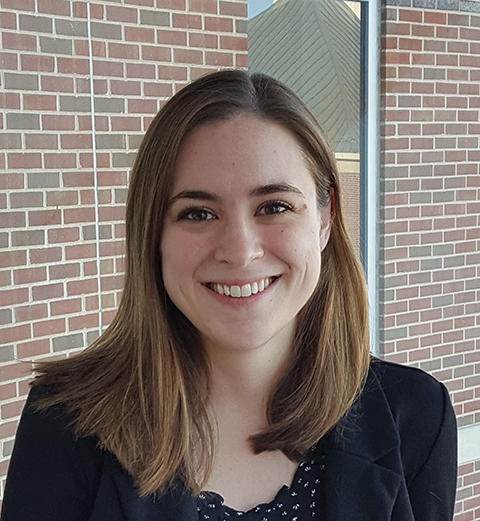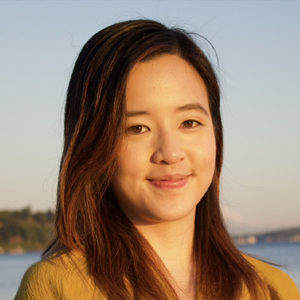MOSAIC scholar loves to share the fun of science
Rene Arvola decided to pursue an academic career because she likes working with people. When she thinks about working as an academic researcher, she says she doesn’t picture the “let me work in my tower, leave me alone” that many people do.
“The job of a PI is not just the science,” she said. “It’s to support your trainees to do the best work that they can do. Both as people and as scientists. The idea of working with students has always appealed to me. And to me, that is the unique part of academia.”

Arvola is now a postdoctoral fellow at Ohio State University and a scholar in the American Society for Biochemistry and Molecular Biology Maximizing Opportunities for Scientific and Academic Independent Careers, or MOSAIC, program. As a MOSAIC scholar, she will investigate the roles of the protein UPF3 in nonsense-mediated mRNA decay, or NMD, an mRNA degradation process that affects around 10% of the transcriptome. She is co-mentored by Sharon Amacher and Guramrit Singh.
Arvola began paving her way as an RNA biologist in graduate school at the universities of Michigan and Minnesota, where she performed what she described as “nitty gritty molecular biology” to study the molecular mechanisms of gene repression mediated by Pumilio, a key RNA-binding protein in development. She said she went into grad school with an open mind but gravitated toward studying RNAs because she admired how the molecule is both versatile and context-dependent.
“If you can think of any context, RNA probably does something cool within it,” she said. “The RNA world is a fun world.”
Arvola grew up in North Vernon, a rural town in south Indiana, and was the first in her family to graduate from college. As a young girl, she didn’t have the slightest clue about being a scientist. She fondly remembers Mr. Snyder and Mrs. Hill, her high school science teachers.
“They helped form the curiosity that led me to pursue science,” she said.
Mr. Snyder, Arvola’s chemistry teacher, formed a strategy board game club for his students. While the games were not generally science-themed, Arvola said the activity captivated her.
“I was a huge nerd, so it was easy for me to engage in that way,” she said.
Since her first exposure in Mr. Snyder’s board game club, outreach has been a consistent part of Arvola’s academic career. She has tutored children from low-income families, hosted underrepresented students of color in her lab and led activities at her local science museum. She even participated in a program that taught students how to build and race a derby car.
Arvola now helps Amacher in the science outreach program BioEYES, at events that bring K–12 students to campus for activities centered on genetics and development using the zebra fish model organism. The students craft DNA molecules, learn about the genetic code, go on science-themed scavenger hunts and view zebra fish embryos under a microscope.
Arvola’s mentors have helped her become both a scientist and an advocate for increasing representation and accessibility in science. They’ve also inspired her to pay it forward.
“I’ve just had really, really great mentors,” she said. “I want to be able to support other people in that way, too.”
Enjoy reading ASBMB Today?
Become a member to receive the print edition four times a year and the digital edition monthly.
Learn moreGet the latest from ASBMB Today
Enter your email address, and we’ll send you a weekly email with recent articles, interviews and more.
Latest in People
People highlights or most popular articles

2026 ASBMB election results
Meet the new Council members and Nominating Committee member.

Simcox wins SACNAS mentorship award
She was recognized for her sustained excellence in mentorship and was honored at SACNAS’ 2025 National Conference.

From humble beginnings to unlocking lysosomal secrets
Monther Abu–Remaileh will receive the ASBMB’s 2026 Walter A. Shaw Young Investigator Award in Lipid Research at the ASBMB Annual Meeting, March 7-10 in Washington, D.C.

Chemistry meets biology to thwart parasites
Margaret Phillips will receive the Alice and C. C. Wang Award in Molecular Parasitology at the ASBMB Annual Meeting, March 7-10 in Washington, D.C.

ASBMB announces 2026 JBC/Tabor awardees
The seven awardees are first authors of outstanding papers published in 2025 in the Journal of Biological Chemistry.

Decoding how bacteria flip host’s molecular switches
Kim Orth will receive the Earl and Thressa Stadtman Distinguished Scientists Award at the ASBMB Annual Meeting, March 7–10, just outside of Washington, D.C.

